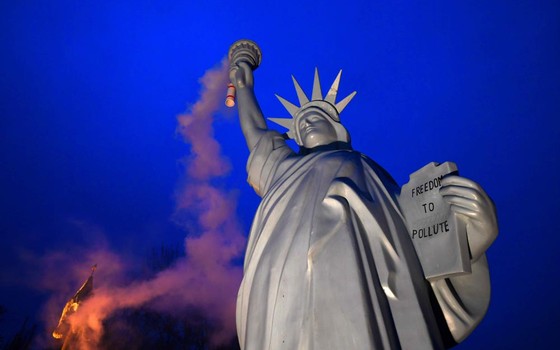
We’ll Have Trump Around for a While
(Spain) on 9 November 2017
by Francisco G. Basterra (link to original)
It’s been a year since what was inconceivable became real: the arrival in the White House of Donald Trump, an extravagant millionaire and incompetent charlatan who seized power with his nationalist-populist rhetoric, reflecting the generalized anti-establishment sentiment in ailing post-Great Recession democracies. The 45th president of the United States talks nonsense, promises biblical punishments for enemies of the country, chastises allies. But fortunately, his actions don’t match up to his feverish rhetoric.
The world hasn’t suffered an apocalypse, not even the nuclear apocalypse with which Trump threatened North Korea; Trump hasn’t built an insurmountable wall to close the border with Mexico; he hasn’t thrown out millions of undocumented immigrants. These days, we accept the unbelievable fact that the world’s only real superpower is in Trump’s hands as if it were something almost ordinary. The nightmare has become the new normal. We’re making a mistake, because Trump’s presidency isn’t a reality show, nor is the White House an adult day care center. The cartoonish situation is real. Trump’s presidency is already doing harm, and it’s left the international order without a point of reference. The United States has lost its value, at the same time Trump declares his admiration for the new czar Vladimir Putin or for emperor Xi Jinping. Occupation of the White House by a “botarate,” someone who lacks judgment and who acts foolishly and irrationally, won’t come without a price.
We’re too focused on his crazy tweets. There are more than 36,000 of them, and he has 41.7 million followers, but by fixating on Twitter, we’re missing the bigger picture. Why should Trump care about the editorials that appear in The New York Times? His supporters in Middle America still stand by him because he skillfully understood the cultural, demographic, economic and xenophobic anxieties of poorly educated whites afraid of terrorism. He promised them he would bring back America, an imaginary, overwhelmingly white Anglo-Saxon country that only exists as a nostalgic ideal. Trump doesn’t heed advice; he works on intuition. He’s unaware of his own ignorance, and the presidency hasn’t changed him. It’s surprising to see his love for the military men who make up his royal guard. Three generals − one from the Pentagon, one from the National Security Council and one who is the chief of staff − try to bring order to a dysfunctional White House, and contain the unpredictable impulses of the commander in chief.
Trump has managed to blur the line between truth and fiction. But the economy is growing by 3 percent, unemployment is at a low (4.1 percent), an average of 270,000 jobs are being created each month, and the stock market has reached new highs. Who cares that Trump’s turned the White House into a family business, that he’s encouraging the far right, that he’s undoing the regulatory system? Who cares about the United States abandoning its global responsibilities and becoming the only country in the world to leave the Paris climate agreement? Trump’s voters don’t care about all this. We’ll have Trump around for a while.


